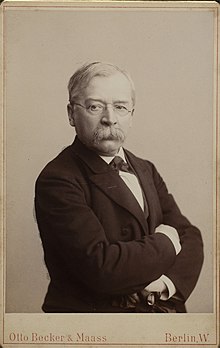Woldemar Bargiel
Woldemar Bargiel (born October 3, 1828 in Berlin , † February 23, 1897 in Berlin) was a German composer and music teacher .
Life
Woldemar Bargiel was the son of the teacher for voice and piano, Adolph Bargiel (1783–1841) and his wife Mariane, b. Tromlitz , (1797–1872). The mother was a pianist and singer. Her grandfather was the flute virtuoso Johann Georg Tromlitz . Adolph Bargiel was Mariane Tromlitz 'second husband. Clara Schumann came from her first marriage to Friedrich Wieck .
Woldemar Bargiel first received music lessons from the family, then from the music theorist Siegfried Dehn . Until his voice broke , he sang in the Royal Cathedral Choir under Eduard Grell and Felix Mendelssohn Bartholdy . He then studied at the Leipzig Conservatory with Moritz Hauptmann , Ferdinand David , Ignaz Moscheles , Julius Rietz and Niels Wilhelm Gade until 1849 .
In 1850 Bargiel returned to Berlin to work as a private tutor. Here he first became a member of the Sing-Akademie zu Berlin and since 1859 at the Conservatory in Cologne . In 1864 he became head of the music school of the Maatschappij tot bevordering der Toonkunst in Rotterdam . There he met Hermine Tours, whom he later married.
At the urging of Joseph Joachim , the founder of the Royal Academic University for Performing Music , Bargiel returned to Berlin in 1874 to teach composition there as a professor.
Bargiel stayed at the Berlin Conservatory until his death on February 23, 1897 and was one of the most respected composition teachers of his time. His students included Waldemar von Baußnern , Leo Blech , Franz Bölsche , Paul Juon , Charles Martin Loeffler , Peter Raabe , Ernst Rudorff , Camillo Schumann and Carl Thiel .
Bargiel's remains were buried in Cemetery II of the Trinity Parish at Bergmannstrasse 39-41 in Berlin-Kreuzberg. His gravestone with a portrait relief by Ernst Herter's hand has been preserved.
Audio language
Although he was related by marriage to Robert Schumann and promoted by him, Bargiel's more classical style of composition is closer to Felix Mendelssohn Bartholdy's music. There are also clear traces of Ludwig van Beethoven's reception in his works . Bargiel was a conservative composer who did not look for new ways in the treatment of harmony and who also did not try to break the traditional forms. However, within these self-imposed limits he moved with great certainty. His compositions testify to skillful design. Similar to Beethoven, Bargiel attached more importance to the processing of the thematic material than to the melodies themselves. Overall, Bargiel can be regarded as one of the most important academic composers of the first half of the 19th century. His works were highly valued by numerous musicians (including Johannes Brahms and Felix Draeseke ) during his lifetime .
estate
In September 2007, the extensive estate of Woldemar Bargiel was acquired by the Berlin State Library , which until then had been in private hands. The estate contains around 1500 letters, certificates, documents, travel diaries, photographs, program notes, reviews from newspapers, compositional material and much more.
Works (selection)
Orchestral works
- Suite in C major op.7
- Concert overture Prometheus op.16
- Overture to a tragedy op.18
- Concert Overture Medea op.22
- Symphony in C major op.30
- Adagio for violoncello and orchestra op.38
Chamber music
- Piano trio No. 1 in F major op.6
- Violin Sonata in F minor, Op. 10
- String Octet in C minor op.15a
- String Quartet No. 3 in A minor, Op. 15b
- Suite for violin and piano in D major op.17
- Piano Trio No. 2 in E flat major, Op. 20
- Piano Trio No. 3 in B flat major op.37
- String Quartet No. 4 in D minor, Op. 47
- String Quartets No. 1 and 2 (unprinted)
Piano music
- Fantasy No. 1 in B minor, Op. 5
- Fantasia No. 2 in D major op.12
- Fantasy No. 3 in C minor, Op. 19
- Suite No. 1 op.21
- Sonata for four hands op.23
- Suite No. 2 in G minor, Op. 31
- Sonata in C major op.34
- several smaller pieces
Choral works
- Psalm 13 for choir and orchestra op.25
- Psalm 23 for female choir and orchestra op.26
- Psalm 96 for choir op.33
- 3 spring songs for choir op.35
- 3 Spring Songs for Choir and Piano, Op. 39
- Psalm 61 for baritone, choir and orchestra op.43
literature
- Robert Eitner: Bargiel, Woldemar . In: Allgemeine Deutsche Biographie (ADB). Volume 46, Duncker & Humblot, Leipzig 1902, p. 215 f.
- Adam Adrio: Bargiel, Woldemar. In: New German Biography (NDB). Volume 1, Duncker & Humblot, Berlin 1953, ISBN 3-428-00182-6 , p. 589 ( digitized version ).
- Dean Caceres: The real and inner in art: the composer, conductor and teacher Woldemar Bargiel (1828-1897) . V&R Unipress, 2009, ISBN 978-3-89971-719-8 .
- Eberhard Möller (ed.), Robert and Clara Schumann's correspondence with the Wieck family , Cologne: Dohr 2011 (= Schumann-Briefedition , Series I, Volume 2), ISBN 978-3-86846-046-9 .
Web links
- Works by and about Woldemar Bargiel in the catalog of the German National Library
- CV of Woldemar Bargiel on Klassika
- Foreword to a score edition of the symphony op.30
- Sheet music and audio files by Woldemar Bargiel in the International Music Score Library Project
| personal data | |
|---|---|
| SURNAME | Bargiel, Woldemar |
| BRIEF DESCRIPTION | German composer |
| DATE OF BIRTH | October 3, 1828 |
| PLACE OF BIRTH | Berlin |
| DATE OF DEATH | February 23, 1897 |
| Place of death | Berlin |



